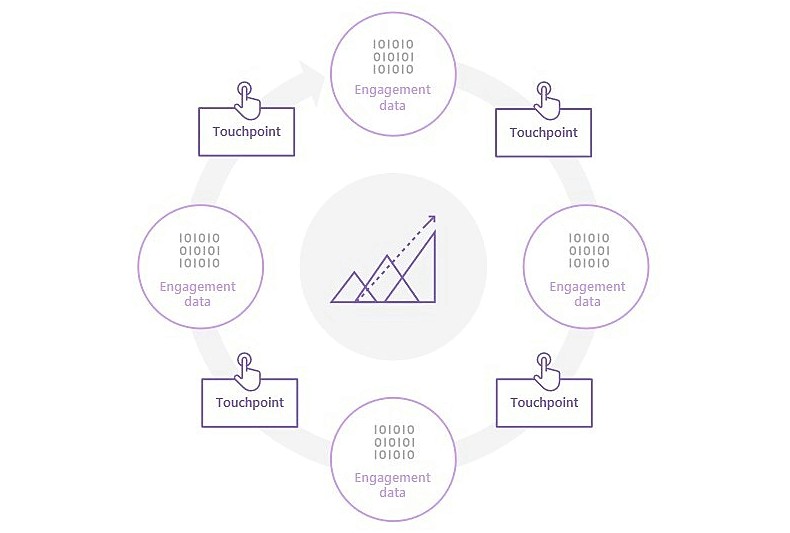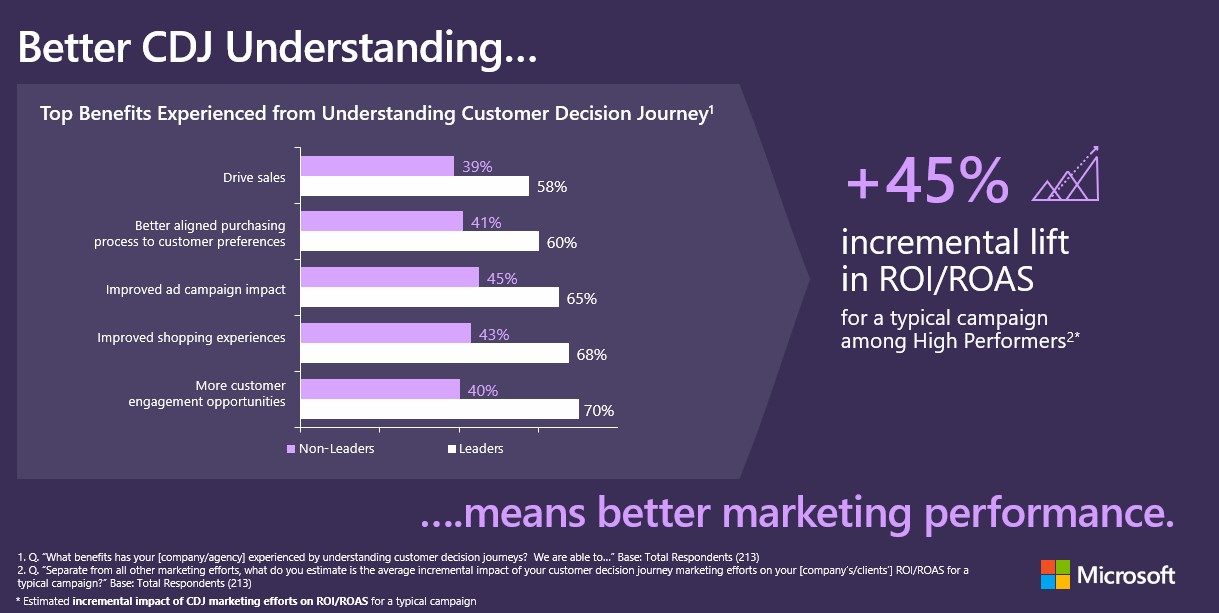From mobile devices to chatbots and other intelligent agents, new digital experiences continue to disrupt customer journeys. Leading brands are not just enduring the changes but embracing the disruption—transforming the customer experience (CX) into a more human experience with meaningful customer touchpoints that drive higher engagement and deeper loyalty.
What is powering this new CX? The CX flywheel.
The concept of the flywheel in this context is simple: It's essentially a virtuous cycle, wherein the more customer touchpoints that you create, the more data you acquire, and more data leads to greater personalization and ROI for more productive and plentiful customer touchpoints.
Like its mechanical counterpart, which stores rotational energy so that it can then be expended—to drive a train, for example—the CX flywheel fuels momentum for marketers by removing friction and blending the physical and digital worlds to propel growth in the digital era.
Businesses like Uber, Airbnb, and Netflix are already harnessing the flywheel, inviting customers further into the marketing process as customers rate and share their experiences, feeding the growth of the company.
In this customer-centric landscape, marketers are rethinking the funnel. They are looking to identify, target, and start dialogues with unique audience segments across all stages of the customer decision journey (CDJ), especially post-purchase stages such as retention and advocacy.
From funnel to flywheel, a new CDJ is taking shape, creating more meaningful touchpoints, and leading to increased revenue and ROI.
Goodbye Funnel
No doubt, future advertising will be completely different from what we know today. Marketers will use AI technologies like digital assistants, intelligent agents, and cognitive services like visual search and natural language processing to engage customers. It will be more natural, more customer-centric and friction-free. And it breaks with the traditional notion that marketers can reach their customers only in linear stages.
The funnel—a cornerstone of sales and marketing teams for over 100 years—is quickly becoming obsolete. Originally created in 1898, the AIDA funnel model (Awareness/Interest/Desire/Action) moved consumers in a linear model from a state of general awareness to a final purchase.
But that was then, and this is the data-driven now.
Hello Flywheel
Today's consumers, especially digital Millennials, are shopping in new ways. They abandon carts in large numbers. They check reviews on mobile devices from the aisles of brick-and-mortars. They post their purchases on social. They may enter the CDJ at any stage.
In today's world, a purchase can mark just the beginning of the CDJ as marketers turn their attention to new activity such as retention, expansion, and advocacy.
Powered by data science and customer momentum, a new customer experience flywheel is replacing the funnel as customers increasingly engage across multiple physical and digital channels. More touchpoints yield more data, which in turn yields more touchpoints—thus causing the flywheel to not only take shape but also spin faster and faster.

Microsoft Advertising's Data-driven marketer's blueprint for success study links the CX flywheel with more meaningful touchpoints and, in turn, higher ROI. We found that a better understanding of your CDJ leads to more customer engagement opportunities and up to a 45% incremental lift in ROI/ROAS.
In fact, today's high performing marketers report that being able to create more customer engagement opportunities is the most important benefit of understanding your CDJ (see below).
How to Build the CX Flywheel
All businesses today should be moving toward a flywheel model that focuses on outstanding customer experiences to engage and empower customers. Here are some tips for success.
Start with the Cloud
The Cloud is the ultimate tool for flywheel success. It helps marketers unlock the potential of growing mountains of data: 2.5 quintillion bytes of data are created every day—with 90% of the world's data created in the last couple of years.
From the Web to customer service to POS systems, data should be collected, managed, and unified in the Cloud.
First-party data such as website visits, time on page, purchase history, geography, etc., should then be combined with second- and third-party data to create richer touchpoints. In fact, 78% of high performers say combining first- through third-party data is a top priority. [Microsoft and Advertiser Perceptions study of 213 marketers and agencies in the US & UK, December 2018—January 2019.] For example, combining real-time search data with second-party LinkedIn data can help advertisers reach a targeted professional performing a specific search.
When collecting, managing, or combining data, high performing marketers are concerned about privacy and data security issues. As more brands move to CX flywheels, they should be very clear about how they are using data and put appropriate safeguards in place to secure customer data. In addition, brands need to be transparent with their customers about how they are using customer data to fuel both experience touchpoints and audience targeting.
Create meaningful touchpoints that drive insights
Think of modern touchpoints as consumer "action points" that help to power your flywheel. They work to spur engagement throughout the CDJ.
For instance, local inventory ads enable customers to shop and buy directly from the SERP. Instagram also lets consumers buy products directly from the app. Skills, digital assistants, and chatbots all work to reduce friction and quickly move consumers to a state of action.
At the same time, these touchpoints should work to collect data and help you build out fuller customer profiles. High-quality, first-party data enables you to create more personalized touchpoints, which further powers your flywheel.
Establish trust
Internal studies at Microsoft Advertising have shown that the majority of today's busy consumers are willing to share their information, especially when it brings them value and saves them time. That said, today's consumers also expect brands to respect their privacy and safeguard their data. This needs to be done in a transparent and respectful way.
The key for successful data management is transparency along with safeguards in place to ensure protection. Consumers should have control of their data with opt-in/opt-out capabilities and full disclosure of how you are using their data.
Based on Microsoft Advertising research, other best-practices include shifting away from cookies to first-party data, creating new internal standards for data collection and usage, and reducing the amount of consumer tracking. [Microsoft and Advertiser Perceptions study of 213 marketers and agencies in the US & UK, December 2018—January 2019.]
Future Flywheels
For years, marketers have been talking about reaching the right person with the right message at the right time. But flywheel success depends on a newer mantra: The right strategy with the right data and the right technology.
How can businesses get their CX flywheels to spin faster? The answer lies in more data, AI, and machine-learning (ML). With the right strategy, the right data, and the right technology, businesses will further transform the customer experience, continuing to explore new ways to enhance the customer relationship.
From personalization to lead scoring to predicting consumer behavior, A/B-testing, website optimization, and more, AI is illuminating the way.





